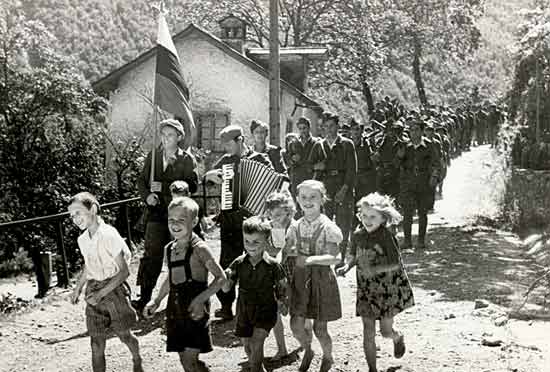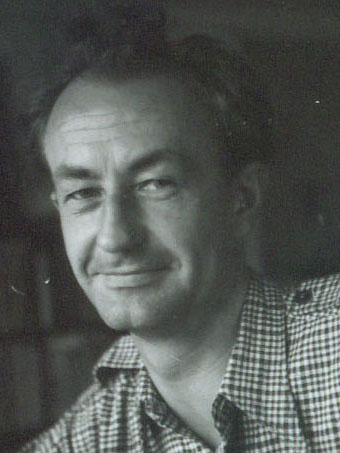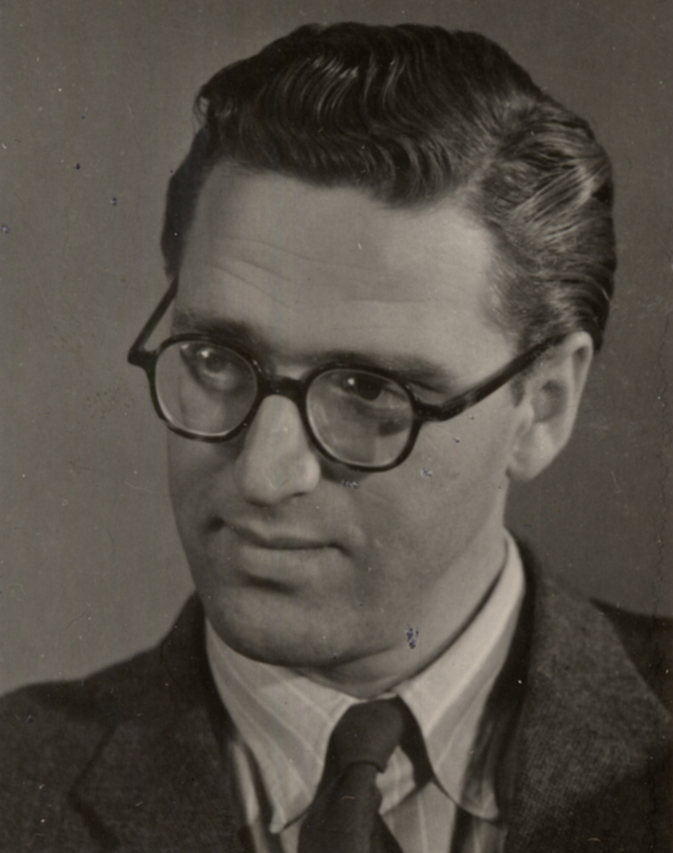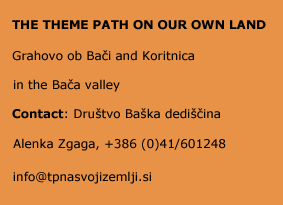THE FILM ON OUR OWN LAND
 Celebrating the liberation. (del Fabbro)
Celebrating the liberation. (del Fabbro)
On our own land was the first Slovene sound feature film. Its theme is the liberation struggle of the partisans and civil population of Primorska during World War II, after several decades of Italian occupation. The film was first shown in Ljubljana in November 1948 and had over 400,000 viewers in the following years.
Some of the best creative minds of the time were involved in the making of On our own land. Its director was the highly promising France Štiglic, and the great writer Ciril Kosmač wrote the script after his short novel Očka Orel (Grandpa Orel). Kosmač had personally experienced nearly three decades of fascist violence and that is why the film story is true to historical data, the characters authentic, and the language simple and powerful. The film was first entitled In the heart of Europe, but towards the end of the shooting it was changed to “the best possible title in the world, because it speaks for all Slovenes, for all these places, and for the film itself, because it must remain faithful to its own land” (Štiglic in Slavje slovenskega filma, TVS, 1975). In the original script the film ended in the Bača Valley, where Stane was to become a teacher after the liberation. The post-war political authorities however demanded that it ended with the liberation of Trieste. The theme path On our own land symbolically transfers the film back to the Bača Valley.
 |
 |
| Ciril Kosmač (Veno Pilon) | France Štiglic (from the archive of Tugo Štiglic) |
The theme path refers to the following seven excerpts from the film On our own land:
- Stane, look at her, that's our valley!
- Oh, sweet Jesus!
- Capitulation! Down with the fascists!
- I’ll take of my shoes as this is the last time I’ll walk our land.
- Do you know this birdie, huh?
- Light it! Light it!
- I’ll be my own master on my own land.
On our own land
director France Štiglic
script writer Ciril Kosmač
director of photography Ivan Marinček
cameramen Ivo Belec, Srečko Pavlovčič
music composer Marjan Kozina
performed by the Slovene Philharmonic Orchestra
scenographers Boris Kobe, Tone Mlakar, Veno Pilon,
costume designer Mija Jarc
makeup artist Mara Kralj
sound engineer Rudi Omota
editor Ivan Marinček
assistant director Jože Gale
still photographer Erminio del Fabbro
producer Janez Jerman,
produced by Triglav film
format: 35 mm b/w film
length: 2983 metres / 106 minutes
Cast: Lojze Potokar, France Presetnik, Mileva Zakrajšek, Štefka Drolc, Boris Sešek, Stane Sever, Miro Kopač, Avgusta Danilova, Majda Potokar, Metka Bučar, Angela Rakar, Jule Vizjak, Franjo Kumer, Stane Starešinič, Tone Eržen, Andrej Kurent, Gabrijel Vajt, Oskar Kjuder, Jože Zupan, Aleksander Valič, Ivo Belec, Jože Gale (and many others).
Historical background:
The Primorska region of Slovenia was annexed to the Kingdom of Italy after World War I. The Italians heavily fortified the border with Yugoslavia and introduced schools with Italian as the teaching language. Many Slovenians lost their jobs or had to move to other parts of Italy in order to keep them. The people of Primorska therefore saw World War II as an opportunity to free themselves from fascist oppression; the majority cooperated with the partisans, while a few people joined the White Guards.
The film's story:
The film focuses on the last two years of the war, from the summer of 1943 to the liberation in May 1945. The story takes place in a small village in the Bača Valley and in the areas where the partisans fought.
A small group of partisans moves into the Bača Valley, the native place of Sova and Stane, a veteran of the Spanish Civil War, to sabotage the railway and fight the Italians. The soul of the resistance in the village is the elderly Obrekar, whose partisan name (nom de guerre) is Grandpa Orel and who is assisted by his wife Ana, daughter Nančika and grandson Boris. The Gradniks – mother Angelca, daughter Tildica, sons Stane and Dragič (both partisans) – are a nationally conscious family like most of the villagers. The calculating Dragarica is the only person in the village who supports the occupation forces, first the Italians and later the Germans, to keep possession of her farmland. Her son Drejc is torn between her and his girlfriend Tildica.
After Italy's capitulation in September 1943 the partisans enter the village and they are joined in the forest by nearly all able men except Drejc, as well as by Tildica and Nančika. Soon the area is occupied by the Germans, who are even worse than the Italians were – the SS officer Adolf Kutschera aims to wipe out the partisans and everybody who collaborates with them in the Bača Valley. The villagers are herded together in the square and he orders four hostages to be shot. Among them is Angelca Gradnik, who takes off her shoes to barefoot “walk our land for the last time". The partisan commander Stane sends Tildica to meet with Grandpa Orel. She is captured by the White Guards and taken to the prison in Dragar's cellar. Drejc shoots the guards, frees Tildica and together they set off for the partisans.
The fight becomes even fiercer and the partisans again sabotage the railway in the Bača Valley. During the long march, Tildica tells Drejc that she is pregnant. Together with their comrades they dream about the freedom that is to come. Down in the valley Kutschera shoots Grandpa Orel, and his wife Ana, but their grandson Boris manages to escape. He joins Drejc, who attacks a German convoy on his own and is killed in the action. At the funeral of Orel and Drejc Boris is given the partisan name Orlič (Litte Eagle) after his grandpa and joins the partisans.

